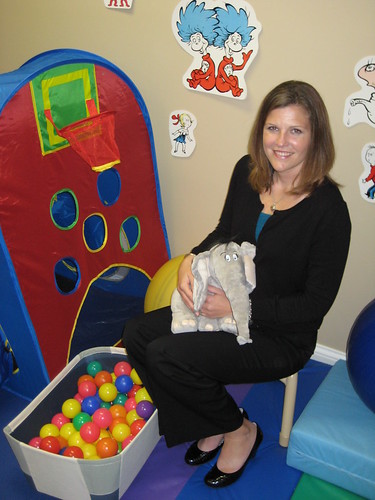
There’s a reason why one of the most recognized symbols for autism is a ribbon made of puzzle pieces. Autism is perhaps one of the most mystifying disorders that a family can deal with. Why? Because no one really knows what causes it, and there is no way to stop or reverse it.
The term autism is used to generally describe a group of complex developmental brain disorders knows as Pervasive Developmental Disorders (PDD). It is estimated that one in every 110 children is diagnosed with autism, making it more common than childhood cancer, juvenile diabetes and pediatric AIDS combined. And according to government statistics, diagnosed cases of autism are increasing every year by 10 to17 percent, with the vast majority of those cases being idiopathic, which means the cause is unknown.
“One of the hardest parts for families is the identification process,” says Ann Marie Noll, MS, Director of Outpatient Therapy Services for TOTS, Fishers (totsindy.com). “Our therapists are often in the position to see those first signals that a diagnosis might be in order, but parents aren’t always ready to hear that.”
Noll says that since autism is a spectrum disorder, every child shows different characteristics, which makes it that much more difficult for parents and physicians. “The process that parents go through is tough,” she says.
“They experience a variety of emotions before they are ready to accept that their child’s delay may be more complex,” Noll explains. “Once families are ready, referrals are made so that they can get the appropriate help.”
So what are initial signs to look for that a child might have autism? According to the National Institute of Child Health and Human Development, you should visit a physician if your child:
- Does not babble or coo by 12 months of age
- Does not gesture (point, wave, grasp, etc.) by 12 months of age
- Does not say single words by 16 months of age
- Does not say two-word phrases on his or her own (rather than just repeating what someone says to him or her) by 24 months of age
- Has any loss of any language or social skill at any age.
Stephanie and David Meier, Carmel parents of three, know about the struggles that families face when a child has autism. Both of their sons, Johnathan, 9, and Will, 8, were diagnosed with autism before reaching the age of two. Their daughter, Paige, 10, is a typical child.

When the couple first learned that Johnathan had autism, they were numb. “We were scared and totally unprepared,” Stephanie says. “We wondered, ‘How did this happen?’, ‘What did we do wrong?’, and ‘How can we fix it?’”
Once their second son, Will, was diagnosed, Stephanie says they weren’t surprised, but they still experienced the same raw and painful emotions as before.
“Every day we have our struggles, just like any other family,” Stephanie says. “Our struggles are just different. We must always try to anticipate what is going to happen next, and be one step ahead of the children. Routines are extremely important, and transitions are always difficult.”
Although Stephanie says that dealing with autism has actually brought her family closer together, she has seen other families torn apart. With that in mind, she offers advice for families who are struggling with an autism diagnosis.
“Don’t be in denial, and get help immediately,” Stephanie says. “There are many resources out there. You just have to ask for help and don’t give up.”
“Also, take time out for yourself and try to spend time with all of your children, not just those with special needs,” Stephanie adds. “But most of all … don’t lose hope.”
You’re Not Alone
Visit these websites for additional information and resources for autism.
ASK aboutspecialkids.org
Autism Society autism-society.org
Answers for Autism aaiwalk.org
First Steps infirststeps.com
Hands In Autism handsinautism.org
Indiana Institute on Disability and Community iidc.indiana.edu
National Autism Association nationalautismassociation.org





